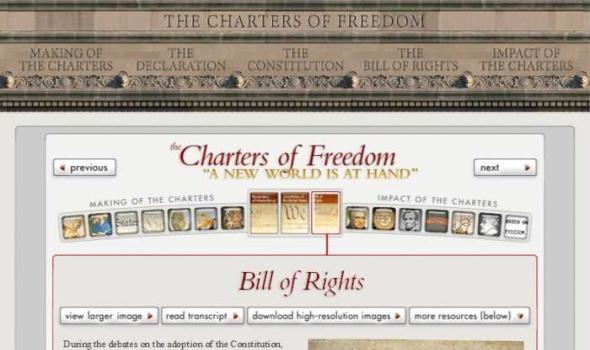Category: History & Historiography, English, Politics, United States, Maryland
Results
National Archives and Records Administraton Eyewitness American Originals from the National Archives Introduction Out of the stacks and vaults of the National Archives comes this selection of eyewitness accounts. They are vivid and intensely personal, transporting us to a deeper understanding of the events described.
Since the signing of the Declaration of Independence, our rights as citizens of the United States have been debated, contested, amended, and documented. The Bill of Rights, the first 10 amendments to the Constitution, established our basic civil rights. Later amendments and court decisions have continued the process of defining our human and civil rights. Documents in the National Archives give voice to our national struggle for personal rights and freedoms. From the Emancipation Proclamation to the five cases that comprised Brown v. Board of Education , this exhibit features a sampling of documents from all regions of the National Archives.
Looking Back on the American Century February 5 � April 30, 2000 In 1940 publisher Henry Luce used the phrase "the American Century" to describe the emergence of the United States as the preeminent world power. Beginning with the accession of a young and energetic Theodore Roosevelt to the Presidency in 1901, the United States began to turn its vast resources onto the world stage. Since that time, through world wars, depression, boom times, social upheavals, scientific and technological developments, and cultural trends, the United States vigorously placed its stamp of influence on the 20th Century. This exhibition presents a small taste of the American Century.
During the debates on the adoption of the Constitution, its opponents repeatedly charged that the Constitution as drafted would open the way to tyranny by the central government. Fresh in their minds was the memory of the British violation of civil rights before and during the Revolution. They demanded a "bill of rights" that would spell out the immunities of individual citizens.
The Federal Convention convened in the State House (Independence Hall) in Philadelphia on May 14, 1787, to revise the Articles of Confederation. Because the delegations from only two states were at first present, the members adjourned from day to day until a quorum of seven states was obtained on May 25. Through discussion and debate it became clear by mid-June that, rather than amend the existing Articles, the Convention would draft an entirely new frame of government. All through the summer, in closed sessions, the delegates debated, and redrafted the articles of the new Constitution.
In 1761, fifteen years before the United States of America burst onto the world stage with the Declaration of Independence, the American colonists were loyal British subjects who celebrated the coronation of their new King, George III. The colonies that stretched from present-day Maine to Georgia were distinctly English in character although they had been settled by Scots, Welsh, Irish, Dutch, Swedes, Finns, Africans, French, Germans, and Swiss, as well as English. As English men and women, the American colonists were heirs to the thirteenth-century English document, the Magna Carta, which established the principles that no one is above the law (not even the King), and that no one can take away certain rights.
"American Originals" is a changing exhibit that has presented the nation's greatest documentary treasures in the Rotunda of the National Archives Building since December 1995. Over the years, the exhibit has featured the first printing of the Declaration of Independence, the police blotter listing Abraham Lincoln's assassination, the first report of the Titanic's collision with an iceberg, Rosa Parks's arrest records, and many other items. Both famous and rare, these documents provide unique insights into the towering figures and events that have shaped U.S. history.
Here will be preserved all . . . the records that bind State to State and the hearts of all our people in an indissoluble union. --President Herbert Hoover, upon laying the cornerstone of the National Archives Building, February 20, 1933 American Originals presents some of the most treasured documents in the holdings of the National Archives. They have passed through the hands of George Washington, Helen Keller, Wyatt Earp, Napoleon, Rosa Parks, and John Hancock, connecting us physically to another moment in time. While some of the documents announce their own importance with a grand design, others quietly mark a revolution.
Here will be preserved all . . . the records that bind State to State and the hearts of all our people in an indissoluble union. --President Herbert Hoover, upon laying the cornerstone of the National Archives Building, February 20, 1933 In 1803 the young republic nearly doubles in size with the Louisiana Purchase. A casualty list of the 54th Massachusetts Infantry Regiment reveals the sacrifices of the most celebrated African-American regiment that fought in the Civil War. A police blotter lists the assassination of President Abraham Lincoln, April 14, 1865.
























